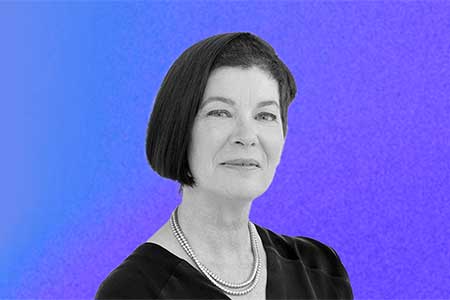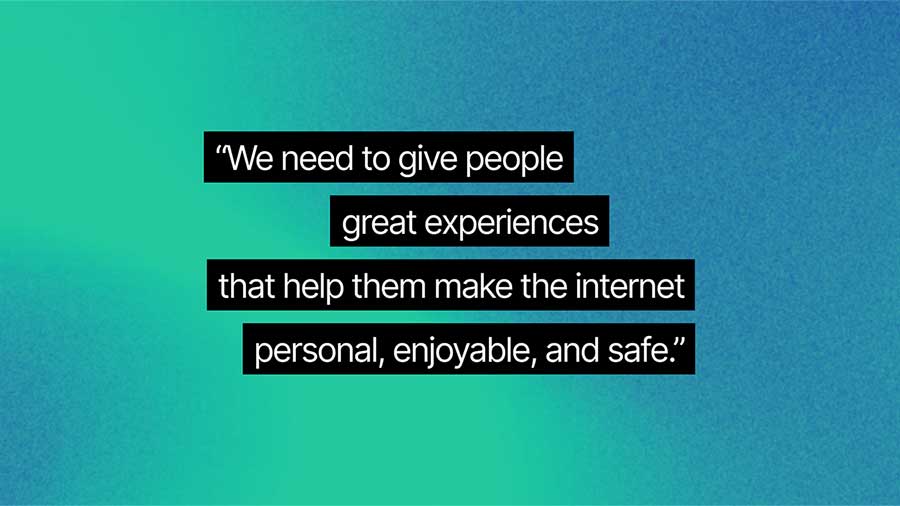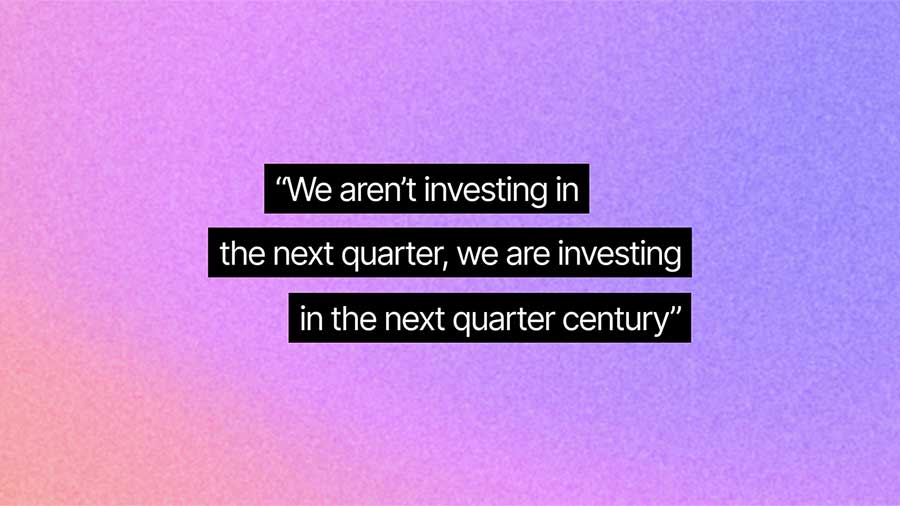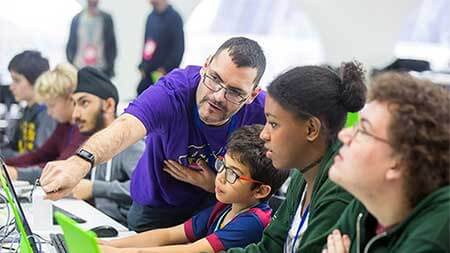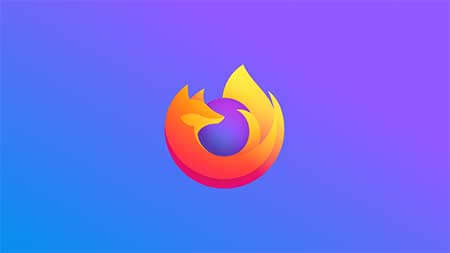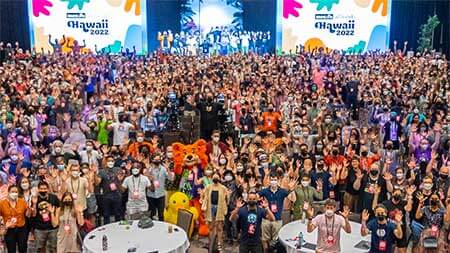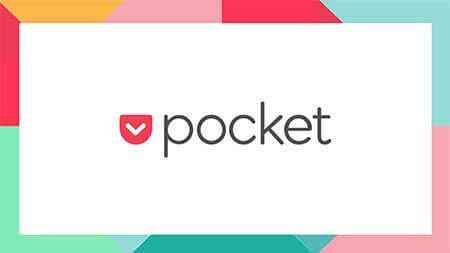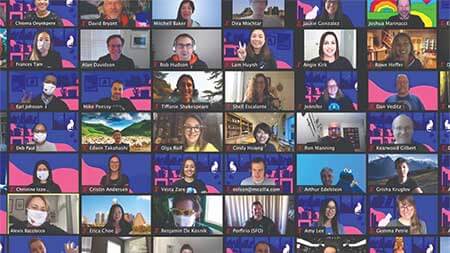Amazing humans, making the internet more humane
It goes without saying: sending the internet in a better direction will require a huge number of
incredibly talented, passionate, and devoted people.
It will need many different kinds of people: engineers, policy wonks, data scientists, activists,
marketing geniuses, artists and startup founders. People who’ve cut their teeth and built up their
skills working in big tech, in activist organizations, in government. And people from all corners
of the earth.
These are exactly the kind of people who are drawn to Mozilla. They are our staff, our fellows, and
our community. They’ve come to Mozilla because they want to do the best work of their lives.
We’ve added nearly 200 of these people in the last two years. And we’re looking for more.

Why I joined Mozilla
Carlos Torres – Chief Legal Officer
Carlos Torres joined the team in August as Chief Legal Officer. Carlos is
responsible for leading the company’s global legal and public policy teams
that develop the legal, regulatory and policy strategy to support the company’s
mission to create a healthy internet. Carlos also serves as Corporate Secretary.
“I was drawn to Mozilla because of its unique voice in technology,” Torres said.
“There is no other organization that combines community, product, technology and
advocacy to produce trusted innovative products that people love. I've always
admired Mozilla for its principled, people-focused approach.”
Most recently, Carlos was general counsel of several venture-backed companies in
the proptech, supply chain and crypto industries. Prior to that he spent over a
decade at Salesforce in a variety of leadership roles. He also served as senior
counsel of a biotech company and started his legal career at Orrick, Herrington
& Sutcliffe.
“I've been fortunate to have worked in a variety of companies and industries,
including B2B SaaS, proptech, crypto, and biotech,” Torres said. “As Mozilla
looks to the next 25 years this background will help me serve as a strategic
business partner helping the company accelerate its growth and evolution. It's
hard to predict what the Internet will look like and how people will use it in
the future, but I do know that Mozilla will be at the forefront of ensuring
the Internet remains a positive public resource applying a mission-driven and
principled approach.”
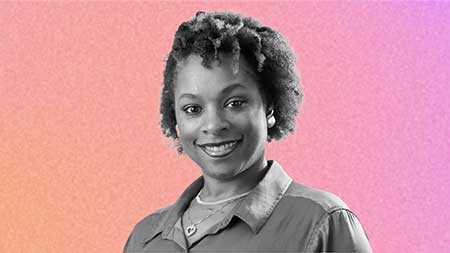
Why I Joined Mozilla
Leigh Felton – VP, Chief of Staff
Leigh Felton joined the team in September as VP and Chief of Staff. In this
role Leigh is responsible for the operational rhythm of the business, building
continuity and strategic planning across teams, and partnering closely with each
Steering Committee member.
“I have been in the technology industry for over 20 years, with 15 of those
concentrated in the Chief of Staff role,” Felton said. “This is a very nuanced
position and can mean many things to different people and organizations. To me,
the Chief of Staff position is about putting the company first, above politics and
above individual goals. It is about helping leaders answer the question of ‘how do
I step out of my defined line of business, to be a leader for the entire organization
and deliver those results as part of the business I lead.’ The Chief of Staff role
is to help drive consistency and predictability to chaos, and to help individuals
feel they are really part of a community and their work and contributions
significantly contribute to the success of that community.”
Leigh is a seasoned leader, business strategist, and communications expert. Most
recently, Leigh served as chief of staff for Microsoft’s Worldwide Public Sector
(WWPS) organization, supporting public sector clients in their cloud adoption and
digital transformation journey. She joined Microsoft’s Public Sector team from the
Microsoft Office of Responsible AI. In this role she drove implementation of
responsible AI across the company. This included companywide implementation strategy
and planning for engineering and in-country teams and the Worldwide Responsible AI
Champs program. Prior to her time at Microsoft, Leigh was appointed Assistant
Director of the Business Services Division of Washington State, by then Governor
Christine Gregoire.
“Over the last few years, I have really concentrated my work and life on how technology
can be a benefit to people and society,” Felton said. “My vision is exactly aligned to
the reason I joined Mozilla. To make the internet available and accessible to all, to
enable technology to benefit all communities across society, without creating significant
discriminatory engines that perpetuate harm in already marginalized communities. Mozilla
stands for so many things, but most of all, it is supporting a technological future that
exists with a mindset of people first rather than revenue first. I am all on board for
that and want to assist in that mission any way I can.”

Mozilla Ventures Highlight:
Anne Kim
SAIL has received funding from Mozilla Ventures, our impact venture fund.
Learn more about Mozilla Ventures here.
If you’ve ever dreamed of writing a graduate thesis that would spawn a multi-million dollar
company to save countless lives, then you need to ask Anne Kim how she did it.
In a perfect world, it would be easy to share and analyze critical data in healthcare.
This would make collaboration and innovation across the medical sector swift and secure.
It would mean that the best minds in the world would have quick access to the research they
need to discover new ways to save and prolong life. “It would be beneficial to researchers
and ultimately patients themselves,” Kim explains.
But the world is not (yet) perfect. Often researchers are restricted to data gathered at
specific hospitals, which leads to non-representative samples, and limited or biased insight.
Worse, that data gets clogged up in months-long anonymization processes.
“It’s difficult to balance the personal privacy of patients,” Kim elaborates. “If patients
have a truly rare disease subtype or are from an underrepresented demographic, then they
have potential risks for exposure and reidentification.”
It makes sense—privacy absolutely cannot be compromised. So what can possibly be done?
“There are many different ways people try to balance sharing data but also protecting data,”
Kim explains, listing approaches like polymorphic encryption, anonymization, and synthetic
data. But Kim uses a different approach. While studying bioinformatics at MIT with her
professor, Sandy Pentland, Anne Kim invented a way to leverage Federated Learning and
Blockchain solutions to enable the sharing of sensitive data without sacrificing patient’s
privacy.
By this method, researchers could learn what they needed from data collected from a real,
diverse, global population, and never actually see the data themselves. The patient is
respected, while the science is liberated. “Federated learning allows you to access data
without ever having to move it or expose it in a raw form,” Kim explains.
Together, Kim and Pentland took her method and created Secure AI Labs (SAIL), a start-up
on a mission to transform medical innovation.
SAIL’s platform will revolutionize the discovery of life-changing drugs by uniting
researchers around the world. Researchers used to have to wait for months for small amounts
of data; now they can have instant access to anonymous data from all the hospitals on SAIL’s
network.
SAIL can also have a major impact on health equity. “By having data available, you are able
to better represent and include different patients,” Kim explains. For example, clinical
trial data can sometimes be overwhelmingly white and/or male, “and that doesn’t necessarily
represent the whole patient population,” Kim says. In her graduate thesis, Kim wrote about a
treatment for juvenile asthma — a treatment that was approved as a first-line therapy and
deemed highly effective, despite being significantly less effective for African
American and Puerto Rican children, as discovered in the post-market analysis.
SAIL and federated learning can help address this, by federating minority data from across
clinical trials to create “more statistical power and signal,” Kim notes.
SAIL also has patient agency top of mind. “Generally we want to make patient data available
for research,” Kim says. “But more specifically, we want to work with patients themselves and
patient advocacy groups.” Kim wants patients to be “active participants” in the process,
collectively negotiating the rights to their data for research usage.
SAIL is everything Mozilla is looking for in a Mozilla Venture’s project. Its innovative
approach to disrupting a hugely important field is breathtaking, while the company itself
embodies the values we hold nearest to our hearts: privacy, transparency, and collaboration.

Mozilla Fellows Highlight:
Crystal Lee
Crystal Lee – Senior Fellow, Responsible Computer Science
“I have always thought of Mozilla as an organization that takes a critical approach to
building a better internet,” says Crystal Lee, a Senior Fellow in Mozilla’s Responsible
Computer Science Challenge, which brings interdisciplinary, critical perspectives to
technology in undergraduate computer science curricula. “The research that Mozilla
produces — alongside its privacy conscious products — represent the best in the business
in a world that often fetishizes tech as an unqualified good. I’m really proud to be part
of an organization that thinks really carefully about technology as a fundamentally
sociotechnical system.”
Lee is also an incoming Assistant Professor in Computational Media and Design at MIT where
she works on topics related to the social and political dimensions of computing, data
visualization, and disability. Lee says, “I spent a great deal of time during my PhD at
MIT thinking about how to change tech culture within the context of teaching, and my
Mozilla projects have helped me sharpen those ideas while thinking about other connections
to industry and civil society.”
“It can sometimes be difficult to imagine a positive future of the internet when we’re mired
in so much systemic inequality,” says Lee, “but I’m hopeful that there can be a place where
people can meaningfully connect with one another with safeguards against abuse and exploitation.”

Mozilla Ventures Highlight:
Tracy Chou
Block Party has received funding from Mozilla Ventures, our impact venture fund. Learn more about
Mozilla Ventures here.
Imagine being a regular target for misogynistic and racist abuse, and sincerely saying, “The one
place that actually felt safe was Twitter.” That’s what Tracy Chou said after she invented
Block Party, an app designed to
automatically protect Twitter users from online harassment.
As a woman software engineer and an outspoken diversity advocate, Chou was a frequent target of
online attacks. Sometimes these attacks went from offline to the real world, such as the time a troll
followed her all the way from London to San Francisco to harass her. Meanwhile, Chou — and other
victims of online harassment — also have to contend with major misconceptions about the phenomenon.
“Often those who don’t experience online harassment trivialize the harms as ‘not real’ because they’re
‘only’ online. They assume that it’s straightforward for people to just sign off and ignore the trolls,”
Chou explains. “But vicious and vile comments take a real psychological toll, especially at volume, and
being online isn’t optional for many of us, it’s an integral part of our professional and social lives.
Harassment today forces many to make difficult tradeoffs between our mental health and ability to
participate in digital spaces.”
Chou understood that social media sites could be doing more to protect her and other victims of
coordinated and ceaseless online harassment — victims who are frequently women of color and members of
marginalized communities. Social media companies could, for example, automatically mute accounts that
displayed bot-like behavior. Yet Chou also understood that social media companies are structured to put
their bottom line first, and their user protections second. So, she built her own protections. Block
Party is an app that Chou deems “Middleware,”
a third-party piece of software that improves upon a social media site’s user experience in ways the
platform can’t — or won’t.
“Block Party’s focus is on the end user and their experience of safety and control online,” Chou explains.
“Although platforms have their role to play in ensuring safety, their business incentives of growth and
engagement mean their product priorities lie elsewhere. Structurally, there are things we can do as a
third party — more customization, more power tools, cross-platform support — that would never make sense
within platforms.”
With Block Party, accounts that are likely to be trolls won’t even appear in your mentions. You know these
accounts: very few followers, names with certain keywords, often just eggs for profile photos.
Block Party doesn’t delete their tweets; instead, it hides them from the user. They’re not deleted because
they may be needed to show the police — something Chou has had to do — and in the past, that meant needing
to re-sift through the abusive messages. Block Party can also automatically block accounts that have liked
or retweeted other offending tweets. All in all, it makes everyday life online much more manageable for
anyone frequently targeted by harassment campaigns.
The need for these protections has never been greater, as evidenced by Block Party’s meteoric start. It’s
already raised $4.8 million in seed money, and in 2022 Chou landed on Time’s "Women of the Year" list.
“What stays with me are the stories of the people we've helped: activists and journalists and people from
marginalized communities who feel safer on Twitter after using Block Party,” Chou notes. “Around 1 in every
10 Block Party users have tweeted about it, sharing the ways the product has given them more control and
helped them protect their mental health despite an onslaught of vitriol. That's why we do what we do, and
I'm so grateful to get to play a role in keeping them safe.”
Mozilla couldn’t be more proud to be working with pioneers like Block Party. When security and privacy are
not taken seriously by the platforms, it takes people like Chou stepping in to do the work. Currently, Block
Party functions only on Twitter, but Chou plans to bring the same protection to Instagram and other platforms.
We are honored to help her get there.

Why I Joined Mozilla
Brandon Borrman – VP of Global Communications
For more than 20 years, Mozilla’s VP of Global Communications Brandon Borrman has helped
some of the world's most recognized organizations use communications to advance their
business, policy, and social goals. Borrman has built and run communications teams for
companies including Twitter, Ancestry, United Airlines, and Starbucks, and has consulted
for dozens more, including Dropbox, Airbnb, Facebook, Ford, and Cisco.
On his position as Mozilla’s VP of Global Communications, Borrman says, “As the head of
Mozilla's global communications team, my job is to help Mozilla present itself to the
outside world and engage with like minded communities who want to ensure an open internet
for every citizen going forward. I bring 20+ years of experience, having helped numerous
global organizations use strategic communications to drive change and reshape industries.”
On Mozilla and the future of the internet, Borrman says, “I care deeply about the internet
and protecting it as an open, free utility for people around the world. The last 10 years
have obviously shown how fragile that vision of the internet is as a handful of companies
have consolidated their power and influence of the internet at large. Mozilla is uniquely
able to push against this trend and to fight for the users of the internet. That ability
grows from its mission and principles, and is made truly powerful through its history of
turning policy theory into product reality. There's no better organization to work at
today if you care about the future of the internet.”
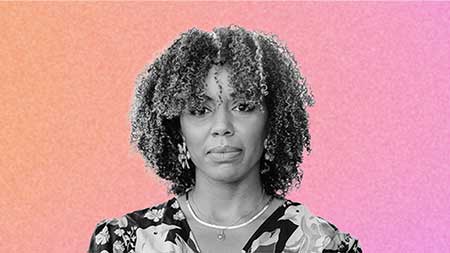
Why I Joined Mozilla
KeyAnna Schmiedl – VP of Diversity, Equity, Inclusion and Sustainability (DEIS)
KeyAnna Schmiedl joined the team in September as VP of Diversity, Equity, Inclusion, and
Sustainability (DEIS). In this new role, KeyAnna oversees Mozilla’s DEIS strategy,
initiatives, and goals.
“Mozilla is about being a guide to a safe and joyful internet. The principles for how to
best go about that hold the tenets of diversity, equity, inclusion, access, and
sustainability at their core,” Schmiedl says on her decision to join Mozilla. “The spirit
of how the organization has come to be informs every aspect of its decision-making and
prioritizing, and the fact that inherent to those priorities are principles of diversity,
equity, access, inclusion, and sustainability is truly remarkable, unfortunately rare,
and exceedingly critical for our time.”
KeyAnna has extensive experience developing global strategies that interlace inclusivity
across organizations from organizational design, competency modeling, safety and wellness,
talent acquisition, and learning and development. Most recently, Schmiedl was global head
of Culture & Inclusion at Wayfair; previously, she worked with top organizations such as
Harvard University, Santander Bank, and IBISConsulting. KeyAnna received the industry’s
esteemed Diversity Leader Award granted by the Diversity Journal due to her stand-out work
in creating an open, equitable, and inclusive workplace culture which also saw her featured
on the Boston Business Journal and Fortune’s 40 Under 40 list and was named a DEI Trailblazer
by Business Insider in 2021.
Across her body of work she has seen the role the internet plays in shaping conversations
around diversity. “Over the last several years we've seen more communities that were historically
"othered" come together through connections on the internet to demand that spaces be safer for
them to experience joy, reap the financial and social rewards of their savvy and creativity,
and acknowledge their contributions,” Schmiedl said. “We've seen what happens when people
harness the power of the internet to shine a light on local challenges and convert that energy
to global movements for change.”

Why I Joined Mozilla
Mohamed Nanabhay leads Mozilla Ventures
He has spent his career in technology, media, and investing where a key theme has been building
bridges, connecting people, and amplifying voices.
At Al Jazeera he was deeply focused on using social technologies to not only distribute news but
also discover and amplify the voices of people being most impacted by power. With Creative Commons
he worked to launch a repository of broadcast quality video footage under the most permissive license.
At Global Voices, bridge building and providing a nuanced understanding through a local lens was key
to what they did. And at the Media Development Investment Fund (MDIF), where he served on the board
before becoming Deputy CEO, they were deeply committed to investing in independent media around the
world providing the news, information and debate that people need to build free, thriving societies.
Prior to his work with Mozilla Ventures, Nanabhay spent time serving on Mozilla’s board of directors.
His work with Mozilla ties into his passion for thinking about how we better use technology in a
meaningful way. “Mozilla is this unique place where everyone uses different tools to work toward the
Mozilla Manifesto — whether product, or advocacy, or philanthropy,” says Nanabhay. “Being able to
think about adding a new tool, venture capital, was an exciting opportunity. It will allow us to go
out and find others who are values aligned and scale our work and impact.”

Why I Joined Mozilla
Zhilun Pang – Director, Finance and Admin
Meet Zhilun Pang, Mozilla Foundation’s Director of Finance & Administration. Zhilun, who goes by “Z,”
came to Mozilla Foundation with 17 years of experience in finance and operations. Z started his career
in the investment industry, spending 14 years in business management, strategy, and risk management
roles in the global asset and wealth management divisions at J.P. Morgan.
These days, serving a good cause is what motivates Z the most. The Brooklyn-native last worked as the
Director of Finance for a community-based non-profit in NYC and two other non-profits (a social
enterprise incubator and an anti-hunger advocacy organization) prior. Z took a three-year career
break to raise his daughter, which gave him time to think about pursuing his values and “what I want
to be when I grow up again.” This led him to mission-driven work.
Here at Mozilla Foundation, Z hopes to enhance our financial tools to help the organization gain better
insight and make more data-informed decisions on how Mozilla uses its money. “Being a fiduciary is
something I deeply value and was ingrained in me during much of my career at J.P. Morgan. I want to
do my best to safeguard the Foundation’s assets so that we can continue to build on our work,” says Z.
Ultimately, it’s about the mission. “I think about how important the internet is now and how important
the internet will be for my daughter. I’m here to do what I can to help Mozilla build a healthier one.”
 Policy
Policy
The fight continues in Washington
Earlier this year, Mozilla and our allies placed a full-page ad in the Washington
Post in support
of the American Innovation and Choice Online Act
(AICOA) — a bill that levels the playing field and puts control back in the people’s
hands. We also endorsed
the bipartisan American Data Privacy and Protection Act (ADPPA); this federal privacy
proposal tackles the real-world harms that emerge as a result of pervasive data
collection online and abusive privacy practices. Our focus on transparency
continues as well, as we supported legislation
and regulation that seeks to shed light on hidden harms occurring on major internet
platforms.
Learn more
 Advertising
Advertising
Leading by Example
Today’s online advertising practices are terrible for people’s privacy. In order to prove
there’s a better way, Mozilla has launched a prototype transparency project to disclose
the targeting behind every paid ad we place.
Learn more
 Innovation
Innovation
Crowdsourcing research into YouTube’s AI
Mozilla continued investigating YouTube’s opaque recommendation algorithm — with the help
of tens of thousands of volunteers. Equipped with our open-source browser extension, these
citizen scientists helped us peer into the platform’s black box AI and hold YouTube
accountable.
Learn more
 Privacy
Privacy
Sounding the alarm on period trackers
We investigated 25 popular fertility apps and found that the majority did not provide clear
guidelines on what data could be shared with law enforcement. Eighteen of them received our
*Privacy Not Included warning label and our findings were widely shared online and by the
news media.
Learn more
 Firefox
Firefox
Total Cookie Protection
Total Cookie Protection is our strongest privacy protection to date, confining cookies
to the site where they were created, preventing companies from using these cookies to
track your browsing from site to site. Bringing Total Cookie Protection to everyone in
Firefox is our next step towards creating a better internet where privacy is the default.
Learn more
 Mradi
Mradi
Battling misinformation in Kenya
The Tech and Society Fellowship has named Odanga Madung as one of this year’s fellows,
an independent data journalist and entrepreneur based in Nairobi who has exposed a
flourishing disinformation industry in Kenya and pushed social media platforms
to confront it.
Learn more
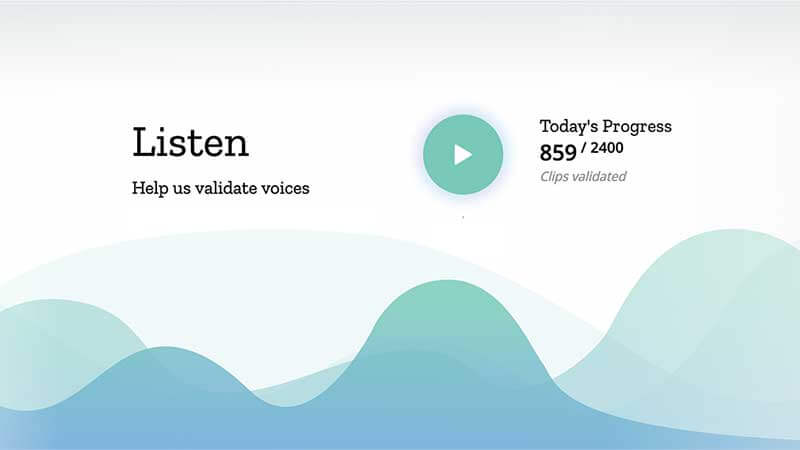 Community
Community
Making voice technology for everyone
Mozilla expanded Common Voice,
our open-source initiative to make voice technology more inclusive, with our biggest update yet.
Common Voice 8
is now the most diverse multilingual open speech corpus in the world, including 13 million
voice clips and newly added languages from Central Kurdish to Norwegian Nyorsk.
Learn more
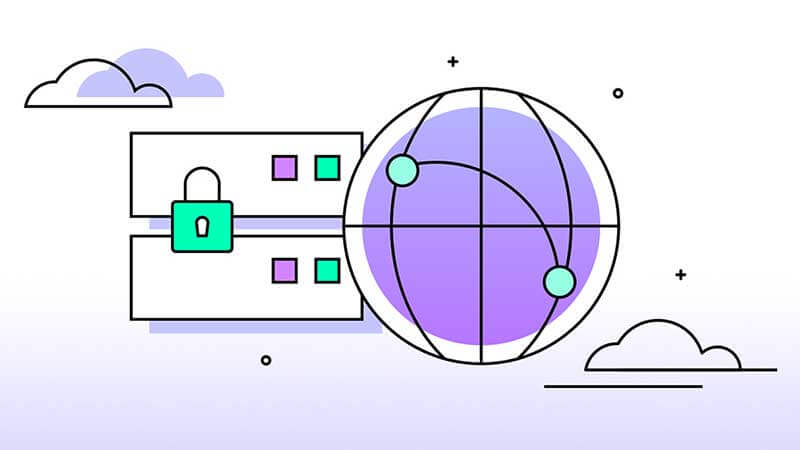 Security
Security
Keeping your online lives private
We combined Multi-Account Containers,
a fan-favorite add-on, and Mozilla VPN,
to offer a unique privacy solution that is only available in Firefox — helping to protect
your browsing activity and your multiple online lives between tabs.
Learn more
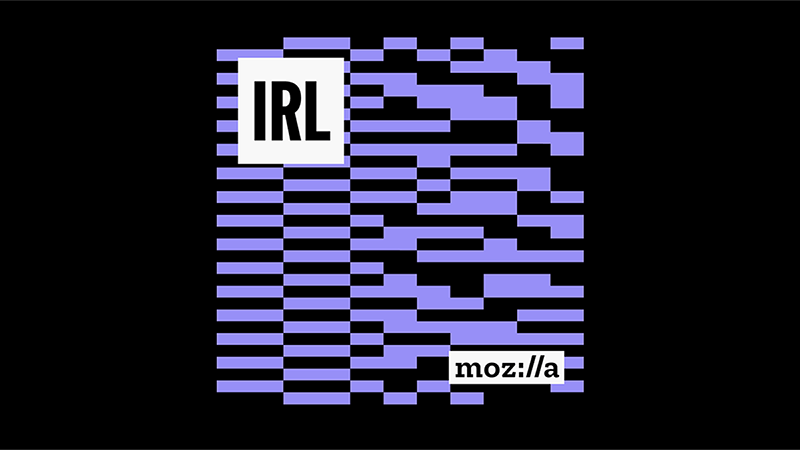 IRL
IRL
Listening to the future of AI
Season 6 of Mozilla’s podcast, IRL, zooms in on data, machine learning and algorithms,
as host Bridget Todd shares real-life stories from around the world. This season doubles
as Mozilla’s 2022 Internet Health Report which highlights the people reclaiming power to
make online life healthier for everyone.
Learn more

